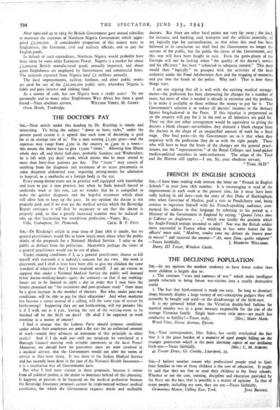Snt,—Dr Kitching's article in your issue of June .18th Is
timely, but we general practitioners would like to know much more about what the public thinks of the proposals for a National Medical Service. I refer to the public as distinct from the politicians. Meanwhile perhaps the views of a general practitioner would not be out of place.
Under existing conditions if I, as a general practitioner, choose to kill myself with overwork it is nobody's concern but my own. My work is piecework, and I shall at least have been able to give my children the same standard of ,education that 1 have received myself. I see no reason to suppose that under a National Medical Service the public -will demand fewer doctor-working-hours---quite the contrary—so that if my working- hours are to be limited to eight a .day in order that I may have the leisure promised .me ".for recreation and post-graduate study " there must be a great increase in the number of doctors. Eut who, under post-war conditions, will be able to pay for their education? And when medicine has become a career instead of a calling, will the same type of recruit be forthcoming? Supposing they are not forthcoming, will my -patients like it if I walk out at 6 p.m., leaving the rest of the waiting-room to be finished off by the M.O. on duty? Or shall I be expected to work overtime as a matter of course?
I find it strange that the Labour Party should propose conditions under which their employees are paid a fiat rate for an unlimited amount of work—mould they advocate an :extension of this principle to other trades? And if I do walk out—,will my misdeeds be 'ventilated at a Borough Council meeting with suitable comments in the local Press? Moreover, we should have no guarantee, once we were involved in a medical service, that the Government would not alter the terms of service as they went along. It was done to the Indian Medical Service and has recently been done in the case of -the National Health Insurance— it is a totalitarian way all Governments have.
But what I find most sinister in these proposals, because it comes from all political parties, is the desire to dominate behind all this 'planning. It happens at present to be focussed on the medical profession because the J3everidge Insurance proposals, cannot be implemented without medical certificates, for which the Government requires docile and malleable doctors. But there are other focal points not very far away ; the land, for instance, and banking, coal, transport and the utilities generally, all are logically ripe for nationalisation, so that when this road has been followed to its conclusion we shall find the Government no longer the servant of the public, but the public the slaves of the Government, and this war will have been fought in vain. Even the germ-plasm of the Gestapo will not be lacking when " the quality of the doctor's service and his efficiency " has been " subjected to adequate control." This duty would then " logically" be grouped with the activities of the local authority under the Food Adulteration Acts and the trapping of motorists and put into the hands of the police. Why not? That is how these things start.
I am not arguing that all is well with the existing medical arrange- ments—the profession has been clamouring for changes for a number of years, but most of what is needed is already in existence and the problem is to make it available to those without the money to pay for it. The Government's solution is to reduce all doctors' incomes to the derisory figures foreshadowed in the Press. If this injustice is perpetrated on us the country will pay for it in the end as all injustices are paid for. They say that any other arrangement would be equivalent to giving the doctors a blank cheque—nevertheless they demand a blank cheque from the doctors in the shape of an unspecified amount of work for a fixed wage. One final point—let the Government see to it that when they negotiate with the profession they do so with the right people. Those who will have to bear the brunt of the changes are the general practi- tioners, not the " representatives " of the Royal Colleges and hand-picked medicchpolitical outsiders in semi-retirement. The adage of the Toad and the Harrow still applies.—I am, Sir, your -obedient servant;
" TOAD, M.D."






























 Previous page
Previous page